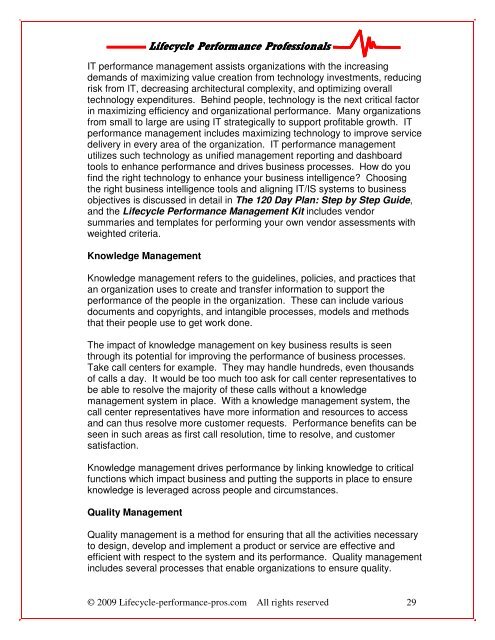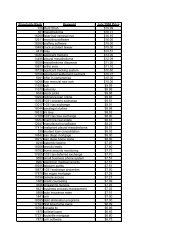Download the Performance Management Fundamentals Guide
Download the Performance Management Fundamentals Guide
Download the Performance Management Fundamentals Guide
Create successful ePaper yourself
Turn your PDF publications into a flip-book with our unique Google optimized e-Paper software.
Lifecycle Lifecycle <strong>Performance</strong> <strong>Performance</strong> Professionals<br />
Professionals<br />
IT performance management assists organizations with <strong>the</strong> increasing<br />
demands of maximizing value creation from technology investments, reducing<br />
risk from IT, decreasing architectural complexity, and optimizing overall<br />
technology expenditures. Behind people, technology is <strong>the</strong> next critical factor<br />
in maximizing efficiency and organizational performance. Many organizations<br />
from small to large are using IT strategically to support profitable growth. IT<br />
performance management includes maximizing technology to improve service<br />
delivery in every area of <strong>the</strong> organization. IT performance management<br />
utilizes such technology as unified management reporting and dashboard<br />
tools to enhance performance and drives business processes. How do you<br />
find <strong>the</strong> right technology to enhance your business intelligence? Choosing<br />
<strong>the</strong> right business intelligence tools and aligning IT/IS systems to business<br />
objectives is discussed in detail in The 120 Day Plan: Step by Step <strong>Guide</strong>,<br />
and <strong>the</strong> Lifecycle <strong>Performance</strong> <strong>Management</strong> Kit includes vendor<br />
summaries and templates for performing your own vendor assessments with<br />
weighted criteria.<br />
Knowledge <strong>Management</strong><br />
Knowledge management refers to <strong>the</strong> guidelines, policies, and practices that<br />
an organization uses to create and transfer information to support <strong>the</strong><br />
performance of <strong>the</strong> people in <strong>the</strong> organization. These can include various<br />
documents and copyrights, and intangible processes, models and methods<br />
that <strong>the</strong>ir people use to get work done.<br />
The impact of knowledge management on key business results is seen<br />
through its potential for improving <strong>the</strong> performance of business processes.<br />
Take call centers for example. They may handle hundreds, even thousands<br />
of calls a day. It would be too much too ask for call center representatives to<br />
be able to resolve <strong>the</strong> majority of <strong>the</strong>se calls without a knowledge<br />
management system in place. With a knowledge management system, <strong>the</strong><br />
call center representatives have more information and resources to access<br />
and can thus resolve more customer requests. <strong>Performance</strong> benefits can be<br />
seen in such areas as first call resolution, time to resolve, and customer<br />
satisfaction.<br />
Knowledge management drives performance by linking knowledge to critical<br />
functions which impact business and putting <strong>the</strong> supports in place to ensure<br />
knowledge is leveraged across people and circumstances.<br />
Quality <strong>Management</strong><br />
Quality management is a method for ensuring that all <strong>the</strong> activities necessary<br />
to design, develop and implement a product or service are effective and<br />
efficient with respect to <strong>the</strong> system and its performance. Quality management<br />
includes several processes that enable organizations to ensure quality.<br />
© 2009 Lifecycle-performance-pros.com All rights reserved 29










